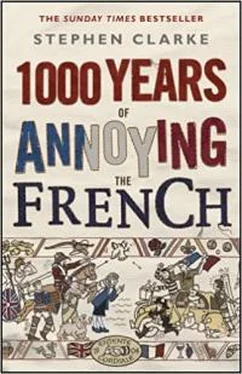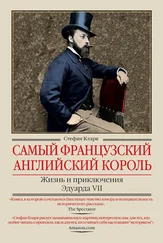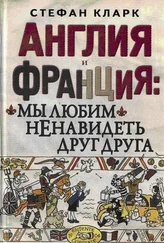Стефан Кларк - 1000 Years of Annoying the French
Здесь есть возможность читать онлайн «Стефан Кларк - 1000 Years of Annoying the French» весь текст электронной книги совершенно бесплатно (целиком полную версию без сокращений). В некоторых случаях можно слушать аудио, скачать через торрент в формате fb2 и присутствует краткое содержание. ISBN: , Издательство: Transworld Digital, Жанр: Старинная литература, на английском языке. Описание произведения, (предисловие) а так же отзывы посетителей доступны на портале библиотеки ЛибКат.
- Название:1000 Years of Annoying the French
- Автор:
- Издательство:Transworld Digital
- Жанр:
- Год:неизвестен
- ISBN:9781407067629
- Рейтинг книги:3 / 5. Голосов: 1
-
Избранное:Добавить в избранное
- Отзывы:
-
Ваша оценка:
- 60
- 1
- 2
- 3
- 4
- 5
1000 Years of Annoying the French: краткое содержание, описание и аннотация
Предлагаем к чтению аннотацию, описание, краткое содержание или предисловие (зависит от того, что написал сам автор книги «1000 Years of Annoying the French»). Если вы не нашли необходимую информацию о книге — напишите в комментариях, мы постараемся отыскать её.
1000 Years of Annoying the French — читать онлайн бесплатно полную книгу (весь текст) целиком
Ниже представлен текст книги, разбитый по страницам. Система сохранения места последней прочитанной страницы, позволяет с удобством читать онлайн бесплатно книгу «1000 Years of Annoying the French», без необходимости каждый раз заново искать на чём Вы остановились. Поставьте закладку, и сможете в любой момент перейти на страницу, на которой закончили чтение.
Интервал:
Закладка:
Bad King John, the accidental hero
John was a truly awful King of England. He was mocked by his contemporaries as ‘Lackland’ and ‘Softsword’ – the latter a reference to his military incompetence, but clearly also a medieval joke about his private parts. In fact, John had only one redeeming feature as far as Anglo-French history is concerned – he was very adept at annoying France.
Within months of his accession, he became embroiled in a French love triangle that would delight modern tabloids. In 1200 he met the above-mentioned Isabelle, daughter of the Count of Angoulême, and, smitten by her beauty (and her large land-holdings), he had her abducted and married her, despite the fact that she was only twelve years old and was already betrothed to a French nobleman.
At the time, abduction of under-age girls was not an uncommon seduction technique, but the cheated suitor complained to the French King, Richard’s old (alleged) lover and enemy, Philippe Auguste, who summoned John to answer for himself. John refused, on the grounds that, as King of England, he was his own master and answerable to no one – Dieu et mon droit, n’est-ce pas?
Philippe Auguste countered that, despite any clever mottos that Richard might have dreamt up, the King of France was still John’s feudal lord in Aquitaine, and therefore had authority over him. He duly stripped John of all his French lands except Gascony, which he didn’t want because it was home to the troublesome Basques and too far from Paris to be kept under control.
This confiscation weakened John so much that the French even felt emboldened to invade his traditional family stronghold of Normandy. At a stroke, Henry II’s and Richard the Lionheart’s empire, which had draped across the west of France like an immense red English curtain, was more or less reduced to England and Biarritz.
Next, John got into a standoff with the Church about who had the right to choose the Archbishop of Canterbury – the same old row that had provoked John’s father Henry II into having Thomas Becket’s brains bashed out. The Pope brought God into the argument by excommunicating John and declaring Philippe Auguste of France the true, divinely blessed King of England. In a fit of self-preservation, in 1213 John backed down, and even agreed to make the Pope the feudal lord of England, offering to pay a rent to Rome. A humiliating defeat, but it turned into an anti-French victory because it took all the wind out of Philippe Auguste’s sails – he had been amassing an army on the Channel coast to come and stake his claim on England, and now had no excuse to invade. At the same time, by a huge stroke of luck, an English fleet encountered and destroyed the French navy, rubbing salt water into Philippe Auguste’s wound.
With uncharacteristic, and unwise, boldness, John followed up these lucky breaks by attacking France. But his army was beaten in summer 1214 at the Battle of La Roche-aux-Moines in Anjou (where John distinguished himself by running away from the fighting) and again at the Battle of Bouvines, in the far north of France, after which John was forced to accept unfavourable peace terms, effectively renouncing any remaining claim he had to Normandy and Brittany.
Sadly for King John, it seems to have been too early in history for an Englishman to know that once you have successfully annoyed a Frenchman, it is much more satisfying to leave him to sulk about it rather than giving him a chance to get back at you.
The English get a French king
The consequence of this series of humiliations and misjudgements was that John’s own barons distrusted him so much that they made him sign the Magna Carta, which essentially protected the barons themselves from injustice at the hands of any future ruler as bad as John.
To make things doubly safe, the barons also invited the French crown prince Louis to come and usurp the English throne – for a short while in 1216, he was actually Louis I of England. A heinous betrayal by the English barons, one might think, but a perfectly logical one. Many of them held lands both in England and Normandy, and therefore felt no exclusive allegiance to either side of the Channel. In fact, they probably reasoned that a French king who ruled over Normandy and England was just as good a feudal lord as an English king – he might even be better if he avoided getting himself into costly wars and demanded less tax.
However, in October 1216, when John died of dysentery while fleeing from the French invaders, the barons made a pro-English choice, switching their allegiance away from Louis and on to John’s son, whom they crowned Henry III. This might well have been because Henry was only nine years old at the time, and therefore easy to dominate – you could make him cut taxes just by taking away his toy horse. But it was also a decision that isolated England from France, and forced the most powerful Englishmen, who had previously thought of themselves primarily as Norman expats, to get their head around the notion that, after 150 years on English soil, their families might actually be staying there.
This growing Englishness became all the more tangible when Henry III came of age in 1227 and began to reign without a regent. He invited a horde of foreign advisers to his court, including members of his French mother’s side of his family, and made things worse after his marriage to a twelve-year-old countess called Eleanor of Provence; the child bride arrived with an entourage of interfering Franco-Italian cousins, whose prominence at the English court made Eleanor so unpopular that Londoners once tried to sink her barge as she was cruising down the Thames.
The Bishop of Lincoln, Robert Grosseteste, 5disapproved of the situation so much that he criticized King Henry publicly, complaining that these French courtiers were ‘foreigners and the worst enemies of England. They do not even understand the English language.’
The French, never ones to stay out of an argument, added fuel to this increasingly heated nationalistic debate. In 1244, King Louis IX of France (the son of the Prince Louis who had been invited to rule England) declared that ‘it is impossible for a man who lives in my country but has lands in England to serve two masters. He must either bow to my authority or to that of the English King.’
The split from France was almost complete.
England takes its punishment where it hurts
Fortunately for France, England was not yet ready to attack it, because Kings Edward I and II, whose reigns lasted from 1272 to 1327, expended most of their energies persecuting the Scots and the Welsh. And they received some painful wounds in reply, including the massacre of the English army at Bannockburn in 1314. However, this mauling at the hands of the Scots and the Welsh had two positive consequences that would come back to haunt the French.
First of all, the English found out to their cost that the Welsh were experts with the murderous longbow. This was a very different animal to the bow that had (possibly) killed Harold at the Battle of Hastings. The Welsh bows were five or six feet long – usually taller than the men firing them – and could shoot heavy, iron-tipped arrows 250 yards with deadly accuracy. It was like the difference between musket balls and sniper bullets. It took a lifetime of practice and forearm strength to pull back the string of a six-foot longbow, and, thanks to this defeat against the Welsh, English village greens were soon echoing to the swish-plunk of arrows hitting targets. It was a sound that would soon have French knights trembling in their armour.
Secondly, at Bannockburn, Edward II’s army of 20,000 knights was decimated by Robert the Bruce’s small force of Scottish footsoldiers because the English tried to charge in full armour across boggy ground. They learned from their mistake, and were to lure the French into exactly the same trap on two historic occasions in the next century.
Читать дальшеИнтервал:
Закладка:
Похожие книги на «1000 Years of Annoying the French»
Представляем Вашему вниманию похожие книги на «1000 Years of Annoying the French» списком для выбора. Мы отобрали схожую по названию и смыслу литературу в надежде предоставить читателям больше вариантов отыскать новые, интересные, ещё непрочитанные произведения.
Обсуждение, отзывы о книге «1000 Years of Annoying the French» и просто собственные мнения читателей. Оставьте ваши комментарии, напишите, что Вы думаете о произведении, его смысле или главных героях. Укажите что конкретно понравилось, а что нет, и почему Вы так считаете.












